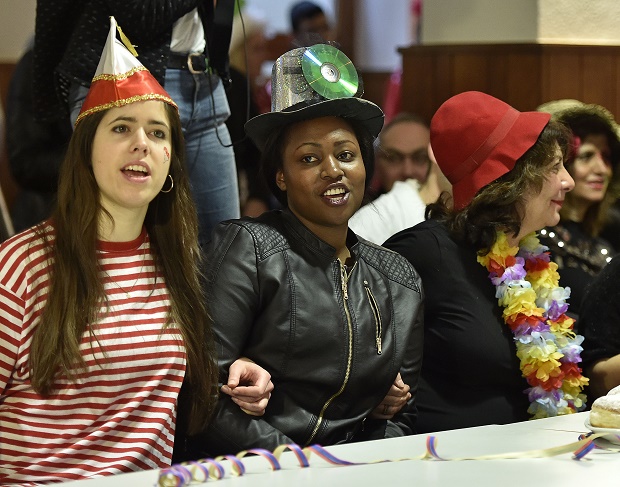
Sharon from Uganda, center, sways to music during a carnival lecture for beginners, held by Caritas with the aim to bring Cologne lifestyle and carnival basics closer to refugees in Cologne, Germany, Tuesday, Feb. 2, 2016. AP Photo
COLOGNE, Germany—Cologne hosts its annual carnival from Thursday with beefed-up security to prevent a repeat of the sex assaults that marred New Year’s festivities and ignited a debate about Germany’s ability to integrate asylum seekers.
Police in the western German city have been struggling to restore public confidence after it emerged that hundreds of women were groped and robbed in a mob of mostly North African and Arab men during celebrations at the start of the year.
READ: German ire over Cologne assaults targets North Africans
Around 1,000 complaints have been filed over the crime spree.
All eyes are now on the week-long event which begins Thursday with “Weiberfastnacht,” roughly translated “Women’s carnival day,” when thousands of female revellers in fancy dress take to the streets, and are invited to cut the ties of men as a symbol of clipping their power.
The highlight of the festivities is Rose Monday, with a parade of giant floats often in the theme of the hottest news of the year.
Among those on show is one of a lonely Chancellor Angela Merkel surveying the EU, while in the background, refugees drown.
READ: Thousands at far-right rally against Merkel migrant policy
German authorities have pulled out all the stops to ensure that nothing spoils the fun at the carnival, which runs through to Ash Wednesday on February 10.
The festivities draw around 1.5 million people to Cologne each year, Germany’s fourth-biggest city.
“No form of violence has any place at the carnival,” said Cologne police chief Juergen Mathies.
“That’s why we will take vigorous action against all those who overstep the line. That goes for drunk abusers, thieves or sexual offenders who cannot accept that a woman says ‘no,'” he said.
Around 2,500 police officers have been called in to patrol the streets, three times as many as last year, as the security budget reached 360,000 euros ($390,000).
Closed-circuit television cameras have been installed and bans imposed on known petty thieves, including suspected pickpockets who took part in the crime spree on New Year’s Eve.
A “security point” for women will be set up in the city, to be staffed by social workers and psychologists and the local judicial system geared up to accelerate the processing of any potential offenders during the festivities.
‘No means no!’
Carnival organisers have even printed a leaflet in both Arabic and English explaining the party to newcomers, including whether alcohol was a must.
Germany’s took in 1.1 million asylum seekers in 2015, many fleeing the war in Syria.
“You can have fun, sing and dance just as easily without alcohol,” according to the flyer.
The neighbouring city of Bonn was more explicit in its advice to refugees, explaining that the word “buetzen” means “kissing somebody on the cheek, one of our carnival customs,” but adding that “sexual overtures are strictly prohibited. Women and men must always consent to the ‘buetzen.’ No means no!”
But a repeat of the New Year debacle was not the only threat.
Security forces are also battling to prevent a possible terror attack, with Germany’s domestic intelligence chief Hans-Georg Maassen reiterating in a report that the situation remained serious after the Paris jihadist atrocities in November.
The wider area around Cologne in North Rhine-Westphalia state is home to Germany’s biggest concentration of radical Islamists.
It is also where the man who tried to attack a Paris police station on January 7 lived.
The attacker was shot dead by French police as he attempted his assault on the one-year anniversary of the jihadist attack on satirical weekly Charlie Hebdo in Paris.
Underlining the nervousness surrounding the potential threats, Mathies had “strongly discouraged” revellers from “dressing up as jihadists or from carrying weapons that you are unable to tell whether they are real or not.”
Despite the fears, Merkel herself urged revellers not to shy away.
“Because we’re going to show that we won’t let anyone keep us from enjoying life or having fun,” she said last month.
“We love our freedom, our freedom of expression and especially our freedom to have fun.”